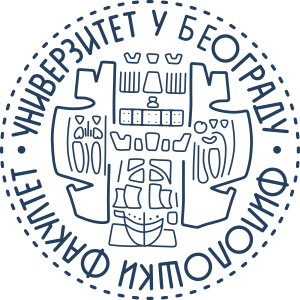Editorial Policy
The journal Annals of the Faculty of Philology publishes papers on theoretical and applied linguistics, literature studies and other related scientific disciplines. The journal was founded in 1961 when the Faculty of Philology became a separate institution within the University of Belgrade. The initial mission of the journal was to provide philologists with a publishing opportunity in a journal that is fully devoted to the philological sciences addressing topics in all languages and literatures then studied at the Faculty of Philology.
The journal Annals of the Faculty of Philology publishes original papers that have not been published previously: original scientific articles, critical review articles and book reviews.
Annals of the Faculty of Philology is an Open Access journal.
Contributions to the journal may be submitted in Serbian (Cyrillic or Roman alphabet), and in one of the following languages: English, French, German, Italian, Russian and Spanish. A paper may also be published in a language other than the ones given above with the consent of the Editorial staff. If the submitted paper is written in Serbian, the author shall provide a summary in English, and where necessary in an additional language. If the submitted paper is written in a language other than Serbian, the author shall provide a summary in Serbian and in English, and where necessary in an additional language.
The Journal is published twice a year.
The journal is indexed in the MLA International Bibliography, DOAJ, ERIH PLUS and EBSCO. Digital copies of the Journal are archived in the Digital Repository of the National Library of Serbia.
PEER REVIEW
The submitted manuscripts are subject to a peer review process. The purpose of peer review is to assist the Editor in making editorial decisions and through the editorial communication with the author it may also assist the author in improving the manuscript.
Annals of the Faculty of Philology applies double-blind peer review, which means that the identity of the authors is unknown to the reviewers and identity of reviewers is not known to the authors, before, during and after the peer review procedure.
Each paper submitted to Annals of the Faculty of Philology is reviewed by two competent reviewers. If necessary, the Editor-in-Chief may assign a third reviewer. Reviewers are expected to provide their reports within a month. Reviewers do not receive honoraria for peer review.
The choice of reviewers is at the Editor’s discretion. The reviewers must be knowledgeable about the subject area of the manuscript and preferably not be affiliated with the same institution as the authors. Persons who have recent joint publications with the authors are not eligible to be reviewers. The Editor-in-Chief shall ensure that the author’s personal data (especially the name and affiliation) will be removed from the manuscript before sending it to reviewers and shall take all reasonable measures to ensure that the authors remain anonymous to the reviewers until the end of the peer review procedure.
Each selected reviewer is provided with a form that contains a series of questions indicating which aspects should be covered in order to make the decision to publish or to reject the manuscript. In the final section of the form, the reviewers are expected to provide a general evaluation of the manuscript. If the reviewer suggests that the paper should be rejected or requests a revision, then the recommendation should be explained in detail. If the reviewer has already assessed the manuscript positively in the answers to the questions in the form, it is not necessary to repeat the assessment in the final evaluation.
Throughout the review process, the reviewers of a paper act independently and they are not aware of each other’s identities. If the decisions of the two reviewers are not the same (accept/reject), the Еditor-in-Chief may assign the paper to additional reviewers.
During the review process, the Editor may require authors to provide additional information (including raw data) if that is necessary for the evaluation of the manuscript’s scholarly merit. These materials shall be kept confidential and must not be used for personal gain.
The Editorial Staff shall ensure reasonable quality control for the reviews. With respect to reviewers whose reviews are convincingly questioned by authors, special attention will be paid to ensure that the reviews are objective and that they follow high academic standards. When there is any doubt regarding the objectivity of the reviews or quality of the review, additional reviewers will be assigned.
OPEN ACCESS POLICY
Annals of the Faculty of Philology is an Open Access Journal. All articles can be downloaded free of charge from the journal’s website: https://anali.fil.bg.ac.rs. The online version of the journal is published simultaneously with the print version. All articles are Open Access under the Creative Commons Attribution-ShareAlike 4.0 International (CC BY-SA 4.0)
The journal does not charge any Article Processing Charges (APC) at any stage of article publication.
SELF-ARCHIVING POLICY
The journal Annals of the Faculty of Philology allows authors to deposit Publisher’s PDF in an institutional repository and non-commercial subject-based repositories or to publish it on Author's personal website (including social networking sites, such as ResearchGate, Academia.edu, etc.) and/or departmental website, at any time after publication. Full bibliographic information (author, article title, journal title, volume, issue and pagination) about the original publication must be provided and an HTML link must be made to the article's DOI.
DISCLAIMER
The views expressed in the published works do not express the views of the Editor and Editorial Board. The authors take legal and moral responsibility for the ideas expressed in the articles. Publisher shall have no liability in the event of issuance of any claims for damages.





